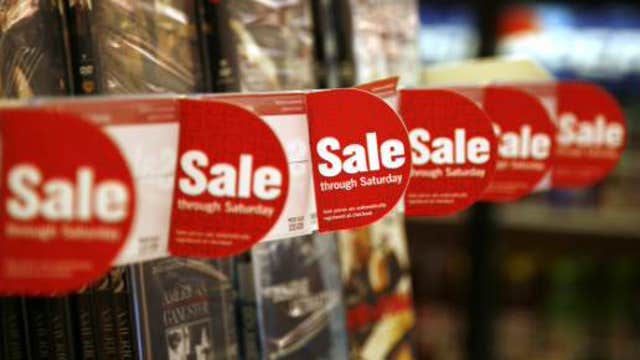Food Costs Eating into Consumers' Saving at the Pump as Holidays Near
Martha Franco says she hadn't really noticed the sharp drop in gasoline prices, even though the mother of three is always shuttling the kids around in her SUV. She has been paying closer attention to the soaring cost of meat instead.
"Meat and grains. Actually it seems like the price of everything is going up," Franco, 30, said following a visit to a Kmart discount store on the outskirts of Chicago, with her two youngest children and a bag of groceries in the shopping cart.
Retailers hoping for a lift to the year-end shopping season see promise in gas prices, which last week fell below $3.00 for the first time since 2010. Those savings, along with the effect of lower heating fuel, could amount to more than $2 billion extra per month for consumers, analysts calculate, enough to buy a lot of holiday gifts.
Franco's attitude is a reality check on those hopes, though: higher food costs are eating into or eclipsing savings from gasoline, and a $2 billion jump in spending could be a much smaller bump after food inflation is taken into account.
"People talk about gasoline prices but you can't look at them in isolation," said Craig Johnson, head of consultancy Customer Growth Partners (CGP). "We think the psychological effect of record food inflation, because it's a bigger part of the family budget, is a key behavioral driver here."
Food prices, which the U.S. Department of Agriculture predicts will rise 2.5 to 3.5 percent this year, is one of the main reasons CGP forecasts holiday spending to rise only 3.4 percent. Most other forecasts call for growth above 4 percent.
Johnson estimates higher food prices will likely swipe about $10 billion out of consumer wallets in November and December compared with a year earlier, double the $5 billion boost expected from cheaper gasoline.
Food accounts for three times more of household budgets than the amount spent at the pump, and he believes food inflation is currently higher than USDA forecasts, running at a clip of 5 percent.
The net impact of lower gas prices versus higher food costs will be felt most by lower income households, which on average own fewer automobiles, said IHS economist Chris Christopher.
Assuming the same amount of gas was bought both years, Christopher estimated consumers saved about $1.6 billion from lower gas prices in October versus the same month last year, while laying out $3.3 billion more on food.
"Remember everyone eats, but not everyone drives a car," Christopher said.
Fortunately for retailers, the fall in gas prices gathered steam and outstripped food inflation in the last month, leaving consumers with net savings of $760 million in October, compared with September, Christopher said.
The caution about food prices is not universal. Joseph LaVorgna, chief U.S. economist at Deutsche Bank, estimated a penny saved at the pump provides a $1 billion boost to consumers and that lower gas prices would have a broad, positive effect on the economy, even accounting for food prices.
With gas trading at about 27 cents per gallon lower than last year, that translates into annualized savings of $27 billion.
Still, retailers which offer gas, food as well as other items may be the best positioned, according to the companies themselves and analysts.
Same store sales results by apparel and teen apparel retailers, especially Gap Inc, were among the biggest disappointments in October, according to Thomson Reuters data, while Costco Wholesale Corp did better than expected.
Wal-Mart (NYSE:WMT) told investors last month that lower gas prices should help its business. On Thursday, citing fuel prices, Wells Fargo raised its earnings targets for convenience store chains Casey General Stores, The Pantry Inc and CST Brands, all three of which deal in groceries and sell gasoline.
"Consumers only have so much money in their budget and when a commodity like fuel goes down in price, it has historically created 'space' for us to compete for a higher spend inside the store," a CST official told Reuters.
Sears Holdings said that it too could benefit, noting shoppers at its Kmart chain were more sensitive to changes in gasoline and other prices.
The fall in gas prices "will hopefully give them added shopping confidence heading into the holiday season," said Imran Jooma, executive vice president of the holding firm.
But standing outside the Chicago area Kmart, shopper Franco did not display such confidence.
"Everything is so expensive and my husband's salary has not increased," she said.
(Reporting by Nathan Layne and Nandita Bose, editing by Peter Henderson)




















